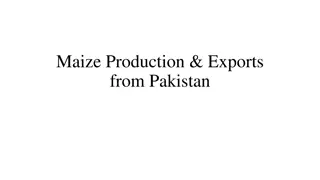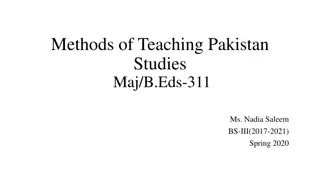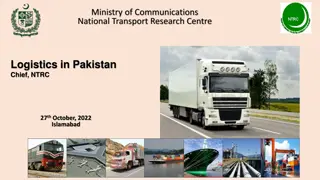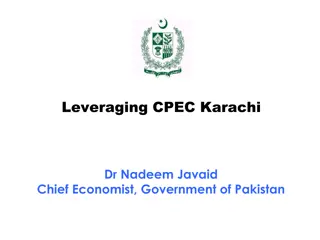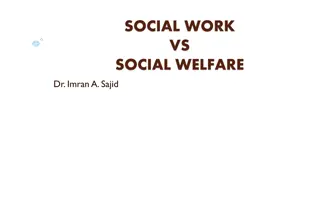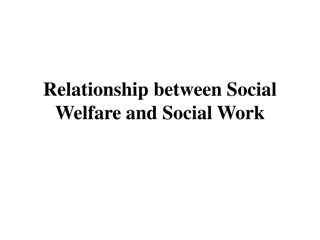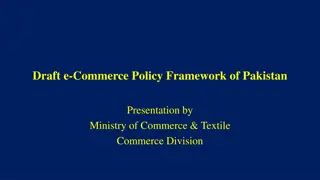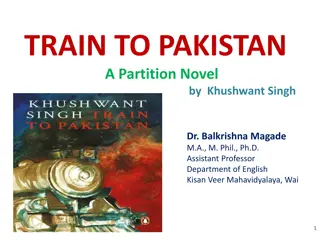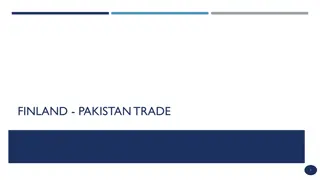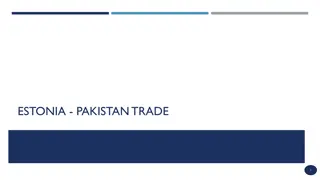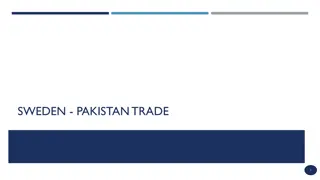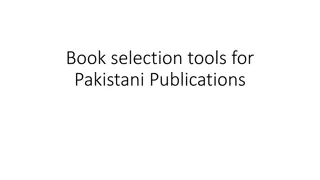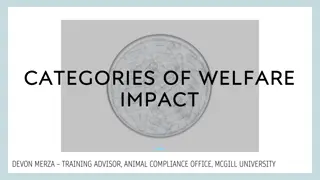Evolution of Social Welfare Policy in Pakistan (1955) and its Impact
The social welfare policy in Pakistan originated in 1955 to address challenges like poverty, lack of education, health issues, inadequate housing, and social maladjustment. Starting with the influx of migrants post-independence in 1947, the policy aimed to establish social services and a welfare state to enhance human welfare. Key elements included community development, private agency development, decentralization of social welfare, new housing policies, and labor protection programs. The policy defined functions to aid people in coping with social issues and aimed to help individuals help themselves.
Download Presentation

Please find below an Image/Link to download the presentation.
The content on the website is provided AS IS for your information and personal use only. It may not be sold, licensed, or shared on other websites without obtaining consent from the author. Download presentation by click this link. If you encounter any issues during the download, it is possible that the publisher has removed the file from their server.
E N D
Presentation Transcript
1stSocial Welfare Policy in Pakistan 1955 Source: Shireen Rehmatullah. (2002). Social Welfare in Pakistan. Karachi: Oxford University Press
Social policy relates to the guidelines for the changing, maintenance or creation of living conditions that are conducive to human welfare (Eldar Shafir, 2013). Social policy is the study of social services and the welfare state (Paul Spicker, 2008).
Background Independence 1947 Migrants influx in Pakistan Food, shelter, clothing No proper administrative structure No technical resources No skilled man-power for social welfare activities
UNTAB advisors Elmina Luke 1951 1st UN advisor on social welfare Dr. F. De. Jongh 1953 Advisor on social policy and administration Mr. Roger Wilson 1953 Advisor on Social sector planning in Planning Commission There could be no planning and programmes unless a well defined and clear cut policy is framed to guide them.
Functions of Social Welfare The basic function of social welfare was defined by Dr. F. De. Jongh as to help people to adjust to the social problems of life. So the concept of social welfare is to help people to help themselves either by organizing self- help or by helping them to locate resources, or by working with them directly or creating new agencies of help.
Prevailing Social Problems 1. Poverty; 2. Lack of education; 3. Ill-health, bad sanitation, and bad nutrition habits; 4. Bad housing; 5. Maladjustment of groups and individuals to new conditions of life; 6. Lack of services for socially endangered groups; and 7. Lack of group work and recreation facilities.
Elements of Social Policy 1. A community development programme; 2. A programme to stimulate the development of private agencies; 3. A programme to stimulate the development of social welfare programme in the provinces and local authorities (i.e. decentralization of social welfare); 4. A new housing policy; and 5. A new extended programme for labour protection.
1. Community Development Programme The key strategy in the implementation of social welfare at that time was the need to work at the grass- root level along with mobilizing the people s own participation and strengths in solving their own social problems through self-help. This was to be achieved through community development programmes. UCD/RCD
2. Stimulate the development of Private Agencies The government s resources are meager and could not support any large scale establishment of social services. Thus there was a need to mobilize communities to organize private agencies so as to make full use of the huge resources of individual good will and individual capital.
The private agencies would be supported by 1. A system of consultative services available to those agencies who would be interested in them; and 2. A system of grant-in-aid for agencies who s projects would be considered of sufficient importance in the national interest. It was assumed that through planned technical and financial assistance, groups of committed individuals would establish needed services in the health, education, and social sector. Edhi Foundation and Hamdard Foundation were a result of this same policy element. The 1961 legislation of Voluntary Social Welfare Agencies Control and Supervision Ordinance was a result of this policy.
3. Decentralization of Social Welfare Programme Establishment of services and programmes in the provinces and local bodies so as to decentralize them and make them accessible to the people at grass-root level. As there was considerable diversity between the province, it was considered that each province develop its own programmes to suit its special needs and interests. NCSW and PCSW were formed to achieve this objective
4. New Housing Policy As a large number of refugees migrated from India to Pakistan, this unsettled population was living in squatter settlements, along the roadsides, and in extreme misery. Therefore, a housing programme with proper sanitation for settlement of refugees, was considered of top most importance. At first, the migrants from India were given the evacuated property of Hindu s and Sikhs who left Pakistan. Likewise, a new housing policy, based on the concept of nuclear- houses or core-houses was initiated in 1958. In Karachi, the government, "planned to construct 300,000 nuclear houses over a period of 15 years. Initially 45,000 houses were planned for two new suburbs, Korangi and New Karachi, on the city's fringes. The housing problem, however, still continues in Pakistan.
5. Extended Labour Protection Programme It was the fifth element of the policy which was given priority. But why it was linked with social welfare? It was simply because a large number of labour population would come from squatter settlements and from the low income areas of the city. By providing support services of protection, education, health and proper housing, the labour welfare could be done.
Criticism 1. Neglecting Islamic Welfare System 2. Voluntary agencies gained momentum 3. It fell into the hands of bureaucracy 4. Imposition of Marshall Law





